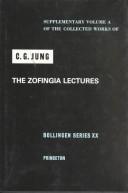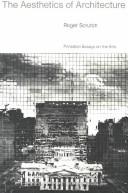| Listing 1 - 4 of 4 |
Sort by
|
Book
ISBN: 1400835550 1299051103 9781400835553 9780691131238 0691131236 0691242232 9781299051102 Year: 2009 Publisher: Princeton, N.J. : Princeton University Press,
Abstract | Keywords | Export | Availability | Bookmark
 Loading...
Loading...Choose an application
- Reference Manager
- EndNote
- RefWorks (Direct export to RefWorks)
This is a collection of the late Heda Segvic's papers in ancient moral philosophy. At the time of her death at age forty-five in 2003, Segvic had already established herself as an important figure in ancient philosophy, making bold new arguments about the nature of Socratic intellectualism and the intellectual influences that shaped Aristotle's ideas. Segvic had been working for some time on a monograph on practical knowledge that would interpret Aristotle's ethical theory as a response to Protagoras. The essays collected here are those on which her reputation rests, including some that were intended to form the backbone of her projected monograph. The papers range from a literary study of Homer's influence on Plato's Protagoras to analytic studies of Aristotle's metaphysics and his ideas about deliberation. Most of the papers reflect directly or indirectly Segvic's idea that both Socrates' and Aristotle's universalism and objectivism in ethics could be traced back to their opposition to Protagorean relativism. The book represents the considerable achievements of one of the most talented scholars of ancient philosophy of her generation.
Ethics --- History. --- Action theory (philosophy). --- Agency (philosophy). --- Akrasia. --- Alcibiades. --- Allusion. --- Ambiguity. --- Analogy. --- Ancient philosophy. --- Apology (Plato). --- Aporia. --- Aristotelian ethics. --- Aristotelianism. --- Aristotle. --- Calculation. --- Callicles. --- Cambridge University Press. --- Causality. --- Chaerephon. --- Charmides (dialogue). --- Charmides. --- Concept. --- Contradiction. --- Critias (dialogue). --- Critias. --- David Wiggins. --- Determination. --- Dianoia. --- Discernment. --- Disposition. --- Ethics. --- Eudaimonia. --- Eudemian Ethics. --- Existence. --- Explanation. --- George Grote. --- Good and evil. --- Gorgias. --- Greek mythology. --- Hedonism. --- Hexis. --- Hippias. --- Homer. --- Human Action. --- Hypothesis. --- Inference. --- Inquiry. --- Intellectualism. --- Kantian ethics. --- Logos. --- Metaphor. --- Moral relativism. --- Morality. --- Nicomachean Ethics. --- Objectivity (philosophy). --- Pericles. --- Phaedo. --- Philosopher. --- Philosophical analysis. --- Philosophy. --- Phronesis. --- Plato. --- Platonic Academy. --- Platonic realism. --- Polus. --- Potentiality and actuality. --- Practical reason. --- Prodicus. --- Prohairesis. --- Protagoras. --- Rationalism. --- Rationality. --- Reason. --- Relativism. --- Republic (Plato). --- Rhetoric. --- Self-actualization. --- Socratic dialogue. --- Socratic method. --- Socratic. --- Sophism. --- Sophist (dialogue). --- Sophist. --- Subjectivity. --- Suggestion. --- Terence Irwin. --- The Death of Socrates. --- Theaetetus (dialogue). --- Theory of Forms. --- Theory. --- Thought. --- Thucydides. --- Treatise. --- Understanding. --- Value (ethics). --- Value judgment. --- Virtue. --- Voluntariness. --- Voluntary action. --- W. D. Ross. --- Writing.

ISBN: 069109764X 9780691097640 0691018405 0691259364 1306408083 1400850916 Year: 1973 Publisher: Princeton (N.J.): Princeton university press,
Abstract | Keywords | Export | Availability | Bookmark
 Loading...
Loading...Choose an application
- Reference Manager
- EndNote
- RefWorks (Direct export to RefWorks)
Includes Jung's famous word-association studies in normal and abnormal psychology, two lectures on the association method given in 1909 at Clark University, and three articles on psychophysical researches from American and English journals in 1907 and 1908.
Association of ideas --- Psychophysics --- Psychoanalysis --- Association of ideas. --- Psychophysics. --- Psychoanalysis. --- Adjective. --- Alcoholism. --- Amplitude. --- Analogy. --- Analytical psychology. --- Anxiety. --- Assonance. --- Bibliography. --- Calculation. --- Catatonia. --- Causality. --- Chronograph. --- Clark University. --- Complex (psychology). --- Computation. --- Consciousness. --- Consideration. --- Criminal psychology. --- Culprit. --- Dementia praecox. --- Dementia. --- Disease. --- Distraction. --- Electrode. --- Embarrassment. --- Epilepsy. --- Eugen Bleuler. --- Exhaustion. --- Experiment. --- Experimental psychology. --- Explanation. --- Feeling. --- Forgetting. --- Galvanometer. --- Hallucination. --- Hans Gross. --- Holograph. --- Hypnosis. --- Hysteria. --- Idiot. --- Imbecile. --- Implicit-association test. --- Indication (medicine). --- Intellectual disability. --- Jokes and Their Relation to the Unconscious. --- Journal of Abnormal Psychology. --- Laughter. --- Lecture. --- Length. --- Masturbation. --- Measurement. --- Mental disorder. --- Neurosis. --- Newspaper. --- Nickname. --- Noun. --- Observation. --- Obstacle. --- Paralysis. --- Percentage. --- Perseveration. --- Phenomenon. --- Phrase. --- Physician. --- Physiological psychology. --- Pity. --- Pleonasm. --- Prevalence. --- Probability. --- Proportion (architecture). --- Psychiatrist. --- Psychiatry. --- Psychological testing. --- Psychologist. --- Psychology. --- Psychopathology. --- Publication. --- Quantity. --- Reminiscence. --- Result. --- Sexual intercourse. --- Standard German. --- Stimulation. --- Stupidity. --- Stupor. --- Suffering. --- Suggestion. --- Symbols of Transformation. --- Symptom. --- The Erotic. --- The Psychopathology of Everyday Life. --- Theft. --- Thought. --- Transference. --- Value judgment. --- Verb. --- Wilhelm Wundt. --- Word Association. --- Writing.
Book
ISBN: 0691071942 0691618097 1400869455 0691645132 9780691071947 Year: 1975 Publisher: Princeton (N.J.) : Princeton university press,
Abstract | Keywords | Export | Availability | Bookmark
 Loading...
Loading...Choose an application
- Reference Manager
- EndNote
- RefWorks (Direct export to RefWorks)
This is a systematic study of the conceptual framework used by critics and scholars in their discussions of influence in art and literature. Göran Hermerén explores the key questions raised in scholarly debate on the topic: What is meant by "influence"? What methods can be used to settle disagreements about influence? What reasons could be used to support or reject statements about artistic and literary influence? The book is based on descriptive analyses in which the author has tried to make explicit what is said or implied in a number of "ations from scholarly writings on art and literature. Throughout, the emphasis is on clarifying the assumptions on which the use of the concept of influence is based, thus describing the limitations and merits of this kind of comparative research for critics and scholars.Originally published in 1975.The Princeton Legacy Library uses the latest print-on-demand technology to again make available previously out-of-print books from the distinguished backlist of Princeton University Press. These editions preserve the original texts of these important books while presenting them in durable paperback and hardcover editions. The goal of the Princeton Legacy Library is to vastly increase access to the rich scholarly heritage found in the thousands of books published by Princeton University Press since its founding in 1905.
Judgment (Aesthetics) --- Influence littéraire, artistique, etc. --- Jugement (Esthétique) --- Influence (Literary, artistic, etc) --- -Themes, motives. --- Judgment (Aesthetics). --- Influence littéraire, artistique, etc. --- Jugement (Esthétique) --- Art --- Influence (Literary, artistic, etc.) --- Literature --- -Artistic impact --- Artistic influence --- Impact (Literary, artistic, etc.) --- Literary impact --- Literary influence --- Literary tradition --- Tradition (Literature) --- Belles-lettres --- Western literature (Western countries) --- World literature --- Themes, motives. --- Philosophy --- Subjects --- Comparative literature --- Littérature --- Themes, motives --- Thèmes, motifs --- Philosophie --- Aesthetics --- Artistic impact --- Influence (Psychology) --- Intermediality --- Intertextuality --- Originality in literature --- Literature and philosophy --- Philosophy and literature --- Theory --- Influence (Literary, artistic, etc.). --- Philosophy. --- Art - Themes, motives --- Literature - Philosophy --- Adjective. --- Aesthetic Theory. --- Aesthetics. --- Allegory. --- Allusion. --- Anachronism. --- Ancient art. --- Anecdote. --- Antithesis. --- Art criticism. --- Art history. --- Artistic merit. --- Baroque painting. --- Caravaggio. --- Carolingian art. --- Causality. --- Cliché. --- Clinamen. --- Close reading. --- Comparative literature. --- Comparative method (linguistics). --- Contemporary art. --- Contemporary philosophy. --- Counterfactual conditional. --- Criticism. --- Cubism. --- D. H. Lawrence. --- Deed. --- Digression. --- Drapery. --- Engraving. --- Epic poetry. --- Explanation. --- Ezra Pound. --- Fine art. --- Florentine painting. --- Forgery. --- French literature. --- Genre. --- Human Action. --- Humanities. --- Iconography. --- Ideogrammic method. --- Ideology. --- Illocutionary act. --- Illusionism (art). --- Illustration. --- Illustrator. --- Imagery. --- Indian aesthetics. --- Individualism. --- Invention. --- Japanese art. --- Journalism. --- Languages of Art. --- Las Meninas. --- Literary genre. --- Literature. --- Marcel Duchamp. --- Metaphor. --- Monograph. --- Mural. --- Mutatis mutandis. --- Narrative. --- Oil sketch. --- Ontology. --- Originality. --- Overreaction. --- Pablo Picasso. --- Paul Gauguin. --- Perlocutionary act. --- Philosopher. --- Philosophy of history. --- Philosophy of language. --- Plagiarism. --- Poetry. --- Publication. --- Publishing. --- Rapprochement. --- Requirement. --- Result. --- Romanticism. --- Secondary source. --- Speech act. --- Still life. --- Stipulation. --- Stipulative definition. --- Suggestion. --- Symbolism (arts). --- The Conceptual Framework. --- Theory of art. --- Theory. --- Thought. --- Titian. --- Treatise. --- Value judgment. --- Visual arts. --- Work of art. --- Writer. --- Writing.

ISBN: 0691101302 0691072663 0691614229 1400857015 1306993547 Year: 1982 Publisher: Princeton University Press
Abstract | Keywords | Export | Availability | Bookmark
 Loading...
Loading...Choose an application
- Reference Manager
- EndNote
- RefWorks (Direct export to RefWorks)
In a systematic overview of classical and modern contributions to aesthetics, Professor Sparshott argues that all four lines of theory, and no others, are necessary to coherent thinking about art.Originally published in 1982.The Princeton Legacy Library uses the latest print-on-demand technology to again make available previously out-of-print books from the distinguished backlist of Princeton University Press. These editions preserve the original texts of these important books while presenting them in durable paperback and hardcover editions. The goal of the Princeton Legacy Library is to vastly increase access to the rich scholarly heritage found in the thousands of books published by Princeton University Press since its founding in 1905.
Arts --- Philosophy. --- Aesthetics. --- Beautiful, The --- Beauty --- Esthetics --- Taste (Aesthetics) --- Philosophy --- Art --- Criticism --- Literature --- Proportion --- Symmetry --- Psychology --- Radio broadcasting Aesthetics --- Aesthetics --- Academic art. --- Action painting. --- Ad hominem. --- Adage. --- Aesthetic Theory. --- Aestheticism. --- Allegory. --- Ambiguity. --- Anecdote. --- Animism. --- Antithesis. --- Aristotelianism. --- Art Express. --- Art as Experience. --- Art criticism. --- Art for art's sake. --- Art in General. --- Art of representation. --- Art. --- Artistic freedom. --- Avant-garde. --- Causality. --- Circumlocution. --- Classicism. --- Conflation. --- Consciousness. --- Consummation. --- Critical theory. --- Criticism. --- Culture industry. --- Deed. --- Dimensional analysis. --- Dynamism (metaphysics). --- Egocentric predicament. --- Emotivism. --- Empiricism. --- Explanation. --- Expressivism. --- Extrapolation. --- Figurative art. --- Fine art. --- Genre painting. --- Genre. --- Hedonism. --- Holism. --- Iconology. --- Idealization. --- Ideology. --- Illusionism (art). --- Imitation (art). --- Individuation. --- Inductivism. --- Inference. --- Invention. --- Irony. --- Jungian archetypes. --- Kitsch. --- Literary theory. --- Literature. --- Marcel Duchamp. --- Mental space. --- Metaphor. --- Narrative. --- Objet d'art. --- Opportunism. --- Originality. --- Philistinism. --- Philosopher. --- Positivism. --- Process art. --- Reality principle. --- Relativism. --- Romanticism. --- Scholasticism. --- Self-image. --- Sentimentality. --- Social practice (art). --- Social realism. --- Solipsism. --- Sophistication. --- Stipulative definition. --- Suggestion. --- Summa Theologica. --- The Artist's Way. --- The Conceptual Framework. --- The Philosopher. --- The Story of Art. --- The arts. --- Theory of Forms. --- Theory of art. --- Theory. --- Theurgy. --- Thought. --- Train of thought. --- Value judgment. --- Vested interest (communication theory). --- Work of art. --- Writing.
| Listing 1 - 4 of 4 |
Sort by
|

 Search
Search Feedback
Feedback About UniCat
About UniCat  Help
Help News
News